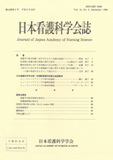Japanese
English
- 販売していません
- Abstract 文献概要
- 参考文献 Reference
- サイト内被引用 Cited by
要旨
糖尿病患者が,食事療法を継続するストレスに対するコーピング行動の特徴について明らかにする目的で,Jalowiecらのコーピングスケールを用いて,103名の糖尿病患者を対象に調査を行い以下の結果を得た.
1)糖尿病患者は,食事療法の負担感より病気自身による人生への障害感が強かった.
2)コーピング行動の因子分析の結果,変化促進行動,あきらめ・逃避,諦観,空想的楽観,期待的静観,回避,鎮静,限定的実行,責任転嫁,不安・心配の10因子が抽出された.
3)糖尿病患者では,病気によってもたらされる病態や症状の重症性,治療のあり方に行動が限定されること,また指示カロリーの低さのような直接食行動に結び付く負担感に対しては,限定的なセルフケアーを実施するなど,現実的な対応をしているように思われる.
4)そのため,ストレス認知の結果としてのコーピングと治療のあり方等に現実的に規定される行動とを区別して考える必要があり,日本版糖尿病コーピングスケールを考えるに際しては,これらのことを考慮することが重要であると思われる.
Abstract
Diabetic patients feel great stress in keeping up their diet. To investigate the relationship between their self evaluation of dietary stress and their coping behaviors, questionnaire method was used. Questionnaires inquiring the grades and types of dietary stress and coping behaviors, were administered to 103 adult subjects with IDDM or NIDDM.
As coping scale, Jalowiec Coping Scale (1981), which was translated into Japanese, was used.
The results were as follows:
1) For diabetic patients, impediment in the way of their lives by the disease is more serious than the stress of continuing diet.
2) Among the coping behaviors, the most frequently used is“Try to maintain some control over the situation”.
3) In diabetic patients, their behaviors are conditioned by states of diseases or therapeutic prescriptions. When we investigate their behaviors, we must distinguish those actions from their behaviors coping with stresses.
4) Coping behavior scale was factor-analyzed into ten factors. These were (1) act to change the problematic situation (2) resignation and evasion (3) being self-possessed and looking out the situation objectively (4) fantastic optimism (5) passive expectation (6) avoidance (7) keeping a tranquil mind (8) taking evasive or limited action (9) charging the problem to another's account (10) anxiety and feeling of uneasiness.
Copyright © 1992, Japan Academy of Nursing Science. All rights reserved.


